Iran’s Leader vows stronger ties with Armenia
Iran's Supreme Leader reaffirmed a steadfast commitment to strengthening ties with Yerevan during a meeting with Armenia's Prime Minister, emphasizing mutual benefits.

Iran's Supreme Leader reaffirmed a steadfast commitment to strengthening ties with Yerevan during a meeting with Armenia's Prime Minister, emphasizing mutual benefits.
“We are deeply committed to enhancing our relations with Armenia, and the collaboration between our two nations, founded on mutual interests and independent of policies of others, will continue with unwavering strength,” Khamenei told Nikol Pashinyan on Tuesday.
Last week, Iran International reported that Tehran and Yerevan have signed an arms deal to supply Yerevan with military equipment and training valued at $500 million.
In a meeting preceding Iran's president-elect's swearing-in ceremony in parliament, Khamenei emphasized that the "security and prosperity of nations" are best ensured through self-reliance and fostering close cooperation with neighboring countries.
He stated that the "interference of distant powers" in the internal affairs of other nations "inevitably results in detrimental consequences for the interveners themselves."
After an apparent disappointment with its long-time ally, Russia, Armenia has been forging closer ties with the United States and France in recent months, including joint military drills with US forces in July.
According to a senior Middle Eastern military official, the reported Tehran-Yerevan agreement has been divided into several contracts and signed over the past few months. For security reasons, Iran International has withheld the official's identity.
Iran International has seen a list of military items Iran is purportedly set to supply Armenia, including drones such as the Shahed 136, Shahed 129, Shahed 197, and Mohajer, as well as air defense missile systems like the 3rd Khordad, Majid, 15th Khordad, and Arman.
The Iran-Armenia arms deal reportedly extends beyond providing suicide drones and air defense missiles. It encompasses intelligence cooperation, close military relations, training, and the establishment of bases on Armenian soil, the source disclosed to Iran International.
Following the report's publication, Armenia's Ministry of Foreign Affairs did not deny the deal in its official email response to Iran International. "Armenia is currently diversifying its security relations within the framework of international law. We don't have any further comment on this," stated a spokesperson for the Ministry of Foreign Affairs of the Republic of Armenia. Meanwhile, Iran's ambassador to Armenia, Mehdi Sobhani, denied the report.
Azerbaijan Republic is seeking a land corridor through Armenia to connect with the Azerbaijani enclave of Nakhichevan.
Khamenei says that Iran considers the Zangezur corridor “detrimental” to Armenia and “maintains a firm stance” on this issue.
"We are strongly committed to developing relations with Armenia, and cooperation between the two countries will continue robustly based on defined interests, without regard for the policies of others," Khamenei added during the meeting with Pashinyan.
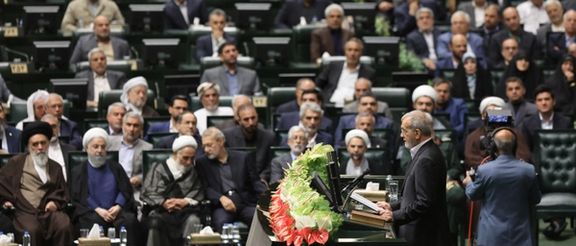
Before his swearing-in ceremony on Tuesday, media in Tehran were warning President Masoud Pezeshkian of the legislative and financial challenges he will soon face.
On Monday, the Reformist-aligned Etemad newspaper reminded readers that academic Bijan Abdolkarimi and Reform Front head Azar Mansouri have previously stated that Pezeshkian is Iran's last chance to address its longstanding financial, cultural, and foreign policy issues and to correct the direction of governance in Iran.
Etemad further quoted a conservative politician, noting that anyone else elected president instead of Pezeshkian would also be seen as Iran's last chance to resolve its multiple crises.
The newspaper emphasized that Pezeshkian's most pressing challenges include addressing the concerns of the majority who boycotted the election and assuring voters that his promises to end social media filtering and bans, and the violent crackdown on women defying compulsory hijab will be seriously pursued.
However, Etemad pointed out that solving these issues is not entirely within the power of any Iranian president.
The daily added that tactics used by hardliners outside the government regarding the bills on social media and hijab could make Pezeshkian's job even more difficult. It also reminded readers that during his campaign, Pezeshkian "guaranteed to stand against the filtering and Morality Police." This brings Pezeshkian to a tough decision: whether to stand by his promises or to yield to the limitations of Iran's political structure.
One of Pezeshkian's staunch supporters, former Tehran Mayor Gholamhossein Karbaschi has stressed that lifting the ban on social media would be the new President's easiest job and as far as the nation is concerned a test of his reliability to stand by his promises.
The daily observed that solving Iran's foreign policy issues and returning to negotiations to revive the 2015 nuclear deal, thereby lifting sanctions and addressing the country's economic problems, will take much longer. While some US officials have occasionally mentioned negotiations with Iran, there is no indication that they are interested in the 2015 deal. Instead, the United States seeks a new comprehensive agreement that would address Iran's regional and international threats and military ambitions and bring its nuclear activities under international control in exchange for easing some sanctions.
Meanwhile, centrist website Entekhab probed into Pezeshkian's ability to confront the upcoming challenges posed by hardliners at the Iranian parliament (Majles) whose vote of confidence to Pezeshkian's cabinet ministers can finally end the saga of forming the new cabinet.
Entekhab wrote that while Pezeshkian is in a hurry to start his work as Iran's President, four conservative groups at the Majles will take their and Pezeshkian's time to review the ministers' credentials.
Despite Supreme Leader Ali Khamenei's call for a quick vote of confidence for the president's cabinet, It is unlikely that hardliners would give their vote of confidence to all the ministers without any hassle.
The first group to obstruct an easy vote of confidence are the neocon supporters of the Speaker Mohammad Bagher Ghalibaf. However, according to Entekhab, as their political behavior is not based on ideology, they might approve the ministers' credentials with minimal opposition.
The second group are moderate conservatives coming from various political groups. They have been supporting Pezeshkian during his campaign and they are not likely to create any problem. However, they form a very small fraction of the Majles.
Another group known as "moderates" who are in between the reformists and conservatives, will also support Pezeshkian. A fourth group, the members of the ultra-conservative Paydari, are the troublemakers. The votes given during the election of Speaker of the Majles showed that they are no more than 60 MPs. However,as many of them are avid politicians whose candidate Jalili lost the presidential election, they might be able to garner support from among other groups or the so-called "independents" to block the approval of one or more ministers.
In another report about Pezeshkian's challenges during his first weeks in office, Rouiydad24 website noted that there is a discrepancy between the Planning and Budget Organization Chief Davud Manzur and the outgoing Economy Minister Ehsan Khandouzi's assessment of the funds available at the treasury as the new government starts its work.
Khandouxzi has said that he will hand over the treasury to his successor with 185 billion rials while Manzur claims that government has 300 billion rials (around $500m) of funds in its treasury at the time of Pezeshkian's inauguration.
The report said that confusion and discrepancy about the extent of the government's debts to the banks and other organizations is another matter that is likely to cause problems for the new government. This comes while some observers and economists in Tehran say no government statistics are reliable.
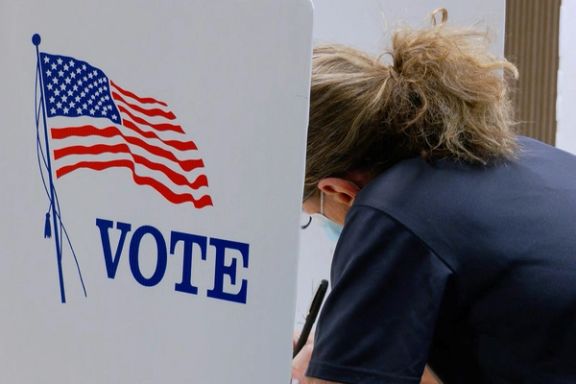
Iran is rejecting claims that it is attempting to undermine former US President Donald Trump's campaign, by interfering in the ongoing election.
"Iran has no objective or activity aimed at influencing the American elections. A significant portion of these accusations are psychological operations designed to create false momentum for election campaigns," the Iranian mission to the United Nations in New York stated on Monday.
US spy agencies say they observed Iran attempting to influence the 2024 election to prevent former President Trump from securing a second term in the White House.
Notably, the press briefing held by the Office of the Director of National Intelligence, suggested a shift in Iran's strategy from previous years.
Instead of merely acting as a "chaos agent," Iran is now spreading “disinformation” through “vast webs of online personas and propaganda mills.” These efforts are in addition to clandestine attempts to influence the campaign in favor of Vice President Kamala Harris.
First reported by the Wall Street Journal, US officials say Iran has accelerated its use of covert social media networks to influence voters in the lead-up of election -- aiming to avoid increased tensions with the US.
Influence by “foreign actors” has been a source of apprehension in recent US elections, especially since 2016, when ‘Russian meddling’ became a major theme, with people on both parties accusing the other of having benefited from it.
Director of the US National Intelligence Avril Haines warned in a statement on July 9 that "Iran is becoming increasingly aggressive in their foreign influence efforts, seeking to stoke discord and undermine confidence in our democratic institutions."
In yet another warning on Monday, an unnamed US intelligence official told Reuters that US foes targeting November's election with influence operations are expected to adapt to presidential contest developments, seemingly alluding to Joe Biden's withdrawal from the 2024 presidential race.
The official suggested that US intelligence agencies anticipate foreign actors will redirect their influence operations towards Vice President Kamala Harris. "We expect these actors to adjust to these developments and integrate them into their influence narratives, aiming to undermine democratic institutions."
There seems to be a growing consensus in Washington that the ‘influence’ offensive from the Tehran has to be taken seriously, even though it’s not yet as serious as threats from Moscow and Beijing –and perhaps not on the same global scale.
Russia, China, and Iran deny all such accusations, punching back with allegations of American influence campaigns –and direct interventions– across the world.
The senior intelligence official told Reuters Tehran and Moscow are sticking to their traditional presidential preferences. According to prior intelligence assessments, Iranian operatives are focused on undermining the Republican ticket, while Russia is making efforts to smear the Democrats.
Foreign actors have already used the July 13 attempted assassination of Trump "as part of their narratives," Reuters quoted the US intelligence official as saying.
Another official explained that Russia and Iran have in the past tried employing actual Americans in their operations through false front companies and third-party websites. "Doing so provides them with cover and offers a more authentic voice," the official said.
The Director of US National Intelligence had warned in May that Iran will pose a significant threat to the upcoming US elections, predicting that Tehran will intensify its cyber and influence activities.
"Iran's actions are becoming increasingly aggressive," Haines told the US Senate Select Committee on Intelligence. She added that Iran seeks to “stoke discord and undermine confidence” in democratic institutions, pointing to their interference in previous election cycles as evidence of this ongoing threat.
In 2021, the US Treasury sanctioned Iranian cyber company Emennet Pasargad formerly known as Net Peygard Samavat Company along with five individuals associated with the company for having "engaged in covert and deceptive activities to disseminate disinformation through websites and social media designed to undermine Americans’ faith in US elections."
Iran International revealed in an investigation with Semafor last year that an Iranian-backed influence network, called the Iran Experts Initiative, sought to build relationships with overseas academics and researchers in the West to affect Washington's foreign policy on Tehran.
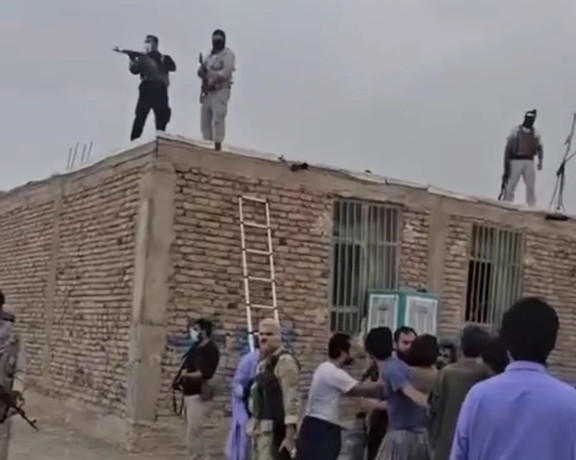
A Baluch woman was killed and three other civilians injured during a raid on a village in Khash, in Iran's Sistan-Baluchestan province, according to rights groups.
According to rights group Halvash, which covers developments in Sistan-Baluchestan Province, security and military forces launched an assault on the village to search residents' homes without a judicial warrant.
When the villagers protested, the officers responded with gunfire, resulting in the death of one woman. A teenager was also among the injured in the shooting, Halvash reported.
The report indicates that military forces obstructed emergency services from accessing the area to transport the injured to the hospital, forcing villagers to use private vehicles to transfer the wounded to Khash Hospital.
Fars News Agency, affiliated with the Revolutionary Guards, reported on the operation, stating that a four-member team transporting explosive materials for Jaish al-Adl was apprehended in the village of Qaderabad.
The separatist militia has refuted the Islamic Republic's allegations regarding the arrest of four individuals linked to the organization in Qaderabad, Khash.
In their official statement, the Baluch group, designated a terror group by Iran, the US and Pakistan, proclaimed: "The regime's propaganda concerning the apprehension of four Jaish al-Adl members in Qaderabad, Khash, is a blatant falsehood and an attempt to justify and cover up the atrocity committed by the notorious security forces in this village.
"The opening of fire by Khamenei's agents on ordinary civilians in Qaderabad, resulting in a grievous crime, is a despicable and abhorrent act that, God willing, will not remain unanswered."
Jaish al-Adl, an insurgent Sunni Baluch group, advocates for an independent Balochistan encompassing Baluch populations on both sides of the Iran-Pakistan border.
The group has conducted numerous major operations in Iran's southeastern region.
In June, the group announced that it had identified and apprehended nine key members of a "terrorist and espionage" network affiliated with the Revolutionary Guards, comprising Iranian and Pakistani nationals, as well as members of the former Afghan government's armed forces.
One of the most intense confrontations between the group and Iranian border forces transpired in April when Jaish al-Adl forces launched simultaneous attacks on five public locations as well as military and law enforcement bases in Chabahar and Rask.
The Baluch community, alongside the Kurds, has long been among the most persecuted minorities in Iran. The region is one of the most impoverished in the country, characterized by high unemployment rates and inadequate infrastructure. Consequently, smuggling fuel, goods, and, in some cases, drugs has become a vital means of survival for many.

The sounds of grief and images of white caskets as parents buried their children, killed by an Iran-made rocket launched from Lebanon into a remote Druze village, underscore the region's uncertainty and fears of a wider war.
A deadly rocket strike on Saturday in Majdal Shams village in the Israeli-occupied Golan Heights killed 12 children playing soccer, becoming the latest victims in a suspected Hezbollah attack on Saturday.
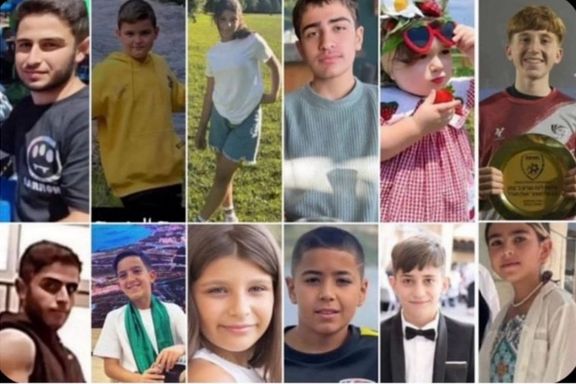
The Druze are an Arabic-speaking ethno- religious group who adhere to the Druze faith, residing in Israel, Lebanon, Syria and Jordan.
The scale of the massacre is the largest civilian loss in Israel since October 7. Druze and Israelis are still mourning and coming to terms with the immense loss, said Anan Wahabi, a lecturer at the University of Haifa, specializing in national security.
Wahabi is also a Druze-Israeli.
“It was unprecedented attack that killed the innocent and beautiful children. Their only guilt was just to come and to try and play football,” he said.
The complex situation of the Golan Heights Druze has been highlighted in the most tragic way possible. Wahabi said those in the area had longstanding Syrian identity in the past, but now have a growing affiliation with Israel, especially the younger generation, some of whom serve in the Israeli military. They are not forced to serve and volunteer should they enlist.
The people of Golan Heights are residents of Israel and an increasing number are choosing to become Israeli citizens. Since the Syrian civil war, and October 7, Israeli citizenship by Druze in that area, jumped significantly. In contrast, other Druze in Israel, serve in the military and police, including the war against Hamas with many reaching high ranks in the IDF and government.
After the 1967 Mideast war, Israel captured the Golan Heights from Syria - and effectively annexed it in 1981.
For the Druze, their identity and history is complex and multifaceted.
“I must tell that the first identity is the Druze identity for them, and we have our own flag. Secondly there is the national identity. We've gotten a lot of messages from all parts of the Israeli society giving condolences and standing with us in this very hard time,” said Wahabi.
The Druze in Syria are angry said Wahabi, calling Hezbollah, which translates to the party of God in Arabic to the party of the devil, instead. He said the Druze in Lebanon are not speaking up and are trying to avoid confrontation, with the Iran-backed Shiite military organization that dominates the country.
"We could hear voices, from the Syrian Druze calling Hezbollah, Hezbsheytan; the party of the devil."
No escaping Geopolitics:
But there is no escaping the geopolitics of the region no matter the ethnic or religious identity.
IDF Spokesman Rear Adm. Daniel Hagari said in a press conference from the scene the rocket that struck Majdal Shams was an Iranian-made Falaq-1. The rocket identified as having had 53 kg load of explosives.
US intelligence officials said there is no doubt that Hezbollah carried out the attack, however, what is not clear is if the children were the target or if they misfired.
Israeli officials were quick to offer support to the community and pointed the blame at Tehran.
Prime Minister Benjamin Netanyahu promised a “harsh response” during a visit to Majdal Shams Monday.
Hezbollah denied responsibility but said it had launched strikes on what it said were military targets in nearby areas.
"A Jewish child murdered on the Gaza border on Oct. 7 and a Druze child murdered on the Golan Heights are the same. These are our children," Defense Minister Yoav Gallant said Monday while with the Prime Minister in Majdal Shams.
A turning point?
Some experts believe the deadly incident involving youth could be a turning point in the conflict.
The FDD’s Behnam Ben Taleblu said Israel’s response will likely be severe, referring to it as “deterrence by punishment.”
“The question is really where and when,” said Taleblu.
Taleblu said a number of factors, like America’s upcoming presidential elections, will determine just how far Israel can go in their response.
“If Israel does look to restore deterrence, it may be a short lived deterrence. Iran, Hezbollah and many of these other actors think there's a longer leash here because the US may want to avoid a military conflict or may want to avoid even the potential for escalation as it gets closer to the election,” said Taleblu.
On Monday, the US declared support for Israel but also cautioned its Middle East ally about escalation with the Iranian-backed Hezbollah.
French President Emmanuel Macron urged Iran’s President Masoud Pezeshkian on Monday to “avoid regional military escalation,” according to Élysée Palace.
The Alma Research and Education center based in Northern Israel published an assessment, saying that Hezbollah finds itself in a“Win-Win” situation, where it benefits regardless of the outcome.
The report, by Alma founder Sarit Zehavi, states Hezbollah has a desire to draw Israel into a full-scale conflict with the aim of consolidating power in Lebanon.
"An occurrence of such a large-scale tragedy resulting in several casualties has the potential to provoke a substantial and notable reaction from Israel. Within the upcoming hours and days, we shall ascertain whether this event truly marks a pivotal moment," as written in the Alma report.

Iranian officials are denying claims that a controversial law, which restricts prenatal screenings and limits access to diagnostic test kits for congenital anomalies, has led to an increase in birth defects.
The law, enacted three years ago, has been criticized by experts and human rights groups for violating women's rights to sexual and reproductive health and endangering women's health and lives.
In an interview with the Tehran daily, Etemad, Amir Hossein Bankipour, a former MP and head of the joint commission responsible for passing the law, denied any increase in birth defects over the past 33 months.
He stated, "The numbers remained the same despite the controversy stirred on social media."
Etemad further reported that since the law's enactment, "The Ministry of Health has yet to provide any statistics on birth defects, merely asserting that despite a reduction of 200,000 pregnancy screenings during the law's enforcement, no increase in fetal abnormalities has been observed."
Typically conducted during the first trimester, these tests are employed to identify and assess the risk of various congenital conditions, such as Down syndrome and chromosomal anomalies like trisomy.
Under the "Supporting Family and Regenerating Population Act", screening procedures may only be initiated at the request of the parents or a specialist doctor and only if substantial evidence necessitating the screening is provided. In such cases, families must independently cover the associated costs.
Nevertheless, a ban announced last year has rendered it impossible to access screening kits for congenital anomalies in Iran.
The Health Ministry’s Food and Drug Administration announced it will no longer issue permits for medical kits that serve as diagnostic tools used primarily in prenatal screening and general disease detection.
That includes the production or importation of pregnancy-associated plasma protein-A (PAPP-A), free beta human chorionic gonadotropin (Beta-hCG) and enzyme-linked immunosorbent assay (ELISA) tests.
Khamenei's punitive push to increase population growth
Although recent statistics are unavailable, officials in 2015 reported that the annual rate of children born with birth defects ranged between 50,000 and 70,000. Etemad’s article also suggests a figure of approximately 60,000.
In 2005, based on a fatwa by Supreme Leader Ali Khamenei and several other religious authorities, the "Therapeutic Abortion" act was passed by parliament and approved by the Guardian Council. The law prevented the birth of children in Iran who either endangered the mother's life, had a short and burdensome life expectancy, or possessed chromosomal abnormalities.
Then, fifteen years later, Khamenei publicly changed his stance, commenting on the necessity of increasing the population, stating that limiting the population was a "mistake" and asking God for forgiveness.
Following his remarks, members of parliament introduced the controversial law, which also mandates that government and state entities actively promote marriage and childbearing, imposes penalties for non-compliance, and prohibits any activities endorsing birth control.
Additionally, it bans government health services from offering family planning services, including contraceptives, vasectomies, and tubectomies.
Birth rate continues to decline, despite state's efforts
In a commentary published last year in Etemad, Abbas Abdi noted that the current administration and parliament have invested at least 250 trillion rials ($500 million) annually to increase the birth rate.
Analysts have argued that Khamenei's desire to boost the country's population is underpinned by a strategic aim to bolster Iran's geopolitical influence and sustain the regime's power through demographic manipulation.
Despite these extensive efforts to promote an increase in fertility rates, Iran's Civil Registration Organization has reported a decline in birth rates for the year 2023.
According to official statistics, births fell from 1,075,381 in 2022 to 1,057,948 in 2023.
Critics of the population increase policy argue that the Islamic Republic has failed to enhance living standards, with official statistics showing that over a third of the population lives below the absolute poverty line, and many more endure increasing hardship despite holding multiple jobs.
Nonetheless, Khamenei advocates for Iran's population to reach at least 150 million by 2050, emphasizing this as a purportedly necessary measure to prevent an aging demographic.